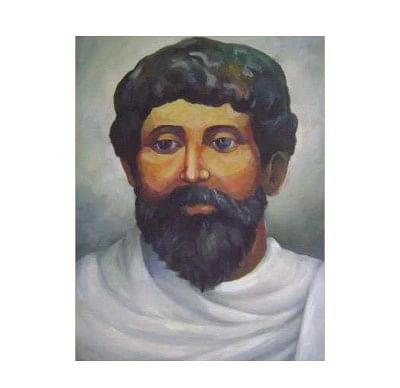A pioneer of rural journalism

A daylong programme was chalked out on July 21 to observe bard Kangal Harinath's 178th birth anniversary. The programme, held at his homestead in Kumarkhali, Kushtia, included a rally, discussion and cultural events. Kangal Harinath Memorial Trust organised the programme.
Sultana Tarun, lawmaker, Kushtia-4 inaugurated the programme with a rally in the morning.
Speakers at a discussion urged the public to follow in the footsteps of Harinath and imbibe his lesson of struggle against oppression. Armed only with a pen, Harinath, a pioneer of rural journalism in the eighteenth century, relentlessly fought against misdeeds of the then predatory zamindars, usurers, kuthials and local administrators.
Sultana Tarun took part in the discussion as chief guest in the evening. Upazila nirbahi officer (UNO) of Kumarkali, Manikhar Rahman, presided over the programme.
Among others, Kumarkhali Municipality Mayor Shamsuzzaman Arun, journalist Bablu Joardar and Lipu Khondokar participated in the discussion. Liton Abbas presented the keynote address about the life and works of Harinath.
Harinath was a literary figure, an editor, a teacher, a reformer and composer of Baul songs.
Harinath is considered a pioneer in journalism at the grassroots level in the then undivided British India. He published a newspaper called Sangbad Prabhakar in 1854. Grambarta Prokashika, also published by Harinath, came out in 1860 -- first as a monthly, then fortnightly and eventually as a weekly magazine. In the beginning the newspaper was published from Calcutta; from 1864 onwards Harinath started printing it from his own Mathuranath Press in Kumarkhali.
Harinath's publications featured news on the repression of farmers by indigo traders and zamindars, and earned credibility for their bold and honest reporting.
Harinath's legacy lives on through his music as well. A disciple of Lalon, Harinath started a Baul group in 1880 and named it 'Kangal Fikir Chander Dal'. He is particularly remembered for the large number and popularity of the Baul songs that he composed. His lyrics and tunes were simple, but the ideas and messages were profound. In his songs Harinath introduced himself as “Kangal” (fakir or mendicant) and the title became part of his name. One of his famed songs is “Din Tho Gelo Shandhya Holo, Paar Karo Amarey”. Satyajit Ray used the song in his film “Pather Panchali”.
Between 1883 and 1893, Harinath published his Baul songs in 16 volumes under the title “Kangal Fikir Chand Fakirer Geetaboli”. Harinath's disciples included Akshay Kumar Maitreya, Dinendranath Roy and Jaladhar Sen.
Harinath wrote 18 books. Among them, “Bijoy Basanta” (1859), “Charucharitra” (1863), “Kabita Kaumudi” (1866), “Bijoya” (1869), “Kobikalpa” (1870), “Akrur Sangbad” (1873), “Sabitri Natika” (1874), “Chittachapala” (1876), “Kangaler Brahmandaved” (1887-95) and “Matrimahima” (1896) are noteworthy.
Harinath died on April 16, 1896. His complete writings were published posthumously, in 1901, as “Harinath Granthaboli”.
Kushtia district administration, with help from Kushtia Zila Parishad, spent Tk 12 lakh to build a complex that also houses a museum and a library.
Recently government sanctioned Tk 8 crore to construct a memorial complex at 'Kangal Kutir', abode of Harinath in Kumarkhali. The construction is underway.

 For all latest news, follow The Daily Star's Google News channel.
For all latest news, follow The Daily Star's Google News channel. 



Comments